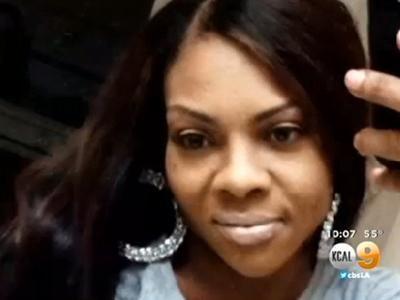Yazmin Vash Payne. Ty Underwood. Lamia Beard. Taja de Jesus. Penny Proud. Kristina Gomez Reinwald.
These are the six transgender women of color who have been killed since the beginning of 2015. Proud, a 21-year-old New Orleans native, was fatally shot multiple times near the intersection of Ursulines Avenue and North Claiborne Avenue.
While the gay community has been making huge strides towards equality, their trans brothers and sisters are being murdered at an alarming rate. The acceptance the LGB community is gaining is not being given to the T.
What’s even scarier than the deaths of these women is that both local and national media outlets appear to be ignoring them entirely.
The original NOLA.com report on Proud’s death grossly misgendered her — disrespecting her gender identity even in death. It also noted the area in which Proud was murdered is known for prostitution, even though there is no evidence that prostitution is connected to her death.
The author of the article, Prescotte Stokes III, defended his misgendering of Proud during an interview with Buzzfeed.
“They called her a girl, but said he was a man,” Stokes told Buzzfeed. “I assume he parades around as a transgender woman, but he is actually a man.”
The article has since been edited to correctly identify Proud and remove the unnecessary comments about prostitution, thanks in large part to the New Orleans LGBT youth of color activist group BreakOUT!, who condemned the news website in a news release regarding Proud’s death.
The news release called the media to action, asking them to respect trans people and their families by using current photographs and the correct pronouns, “to allow our community to maintain dignity both in life and in death.”
In that same press release, BreakOUT! also revealed some startling statistics about the state of the trans community, both nationally and in New Orleans specifically.
Seventy-two percent of all hate crimes are committed in the U.S. are against transgender women. These women are also seven times more likely to experience police violence and physical violence from law enforcement. In New Orleans, 84 percent of transgender people reported experiencing police profiling on the basis of gender identity or sexual orientation, with 57 percent reporting being harassed during the encounter.
Transgender women of color are at an intersection of discrimination. They face racial profiling, transphobia and sexism all at once. and this year, that intersection is proving to be deadlier than ever.
Unfortunately, getting the media to report on the deaths of transgender women is not a direct solution to this problem, because when they do report on the deaths of transgender women of color, the results are often appalling degrading.
Two years ago, Ce Ce Acoff was found murdered outside of Cleveland. When the local newspaper reported on her death, they identified her as an “oddly-dressed man,” listed off her past criminal record and suggested that she may have been engaging in sex work.
Nobody deserves to be disrespected in the way Acoff was. In death, not only was she stripped of her identity but was also labeled as a criminal, simply because she expressed her gender identity.
The media is not always this bad at reporting on the deaths of trans women, however.
Last year, 17-year-old Leelah Alcorn stepped out into oncoming traffic, after posting her suicide note on Tumblr. Her story was covered internationally, including a mention during the Golden Globes telecast and she quickly became the most talked about transgender person in the country.
Reporters took special care to correctly gender Alcorn. No pieces of her past were brought into news stories. Her identity was respected — just as it should be.
But why did Leelah’s death shoot to the front page of news websites, while the six women killed this year are left as footnotes? Why was she granted the respect she deserved by nature of being human, when so many other trans* people are robbed of that respect?
She was white.
Alcorn’s media-friendly photos and eloquently written suicide note made her death an easy story for news outlets to package. She was young, gained overnight Internet fame and had taken her own life. She was the perfect transgender tragedy, palatable to nearly all viewers and likely to spark little to no backlash.
Black trans women of color have the highest suicide rate in the country, yet none of them grabbed the spotlight last year. Though violence against the black community was the biggest news story of 2014, the stories of trans women were swept under the rug, ignored by national outlets in favor of reporting on the plights of their cisgender brothers.
The country rallied around the #BlackLivesMatter and #TransLivesMatter movements, but as the underreporting of these murders have shown, #BlackTransLives apparently do not #Matter.
The six women murdered this year cannot be swept under the rug. Their deaths are indicative of a national misunderstanding of trans identities and general disrespect for black womens’ lives. Their names will not go unknown. This country cannot afford to continue to dismiss the lives of people with hard to cover stories.
By ignoring these women, the media is reinforcing the idea that they are less than people. They can be disrespected, abused and murdered with no repercussions, just by nature of who they are. Setting this precedent puts the entire trans community in danger.
Payne, Underwood, Beard, Edwards, DeJesus and Proud deserve to have their stories told. These women lived rich lives that were unfairly cut short — and if national news outlets continue to ignore these women’s stories, their lives will not be the last we lose this year in the trans women of color community.
Logan Anderson is a 21 year old Mass Communication senior from Houston, Texas. Follow her on Twitter @LoganD_Anderson
Opinion: Trans women of colors’ deaths in the South cannot be ignored
February 22, 2015

Yazmin Vash Payne
More to Discover










